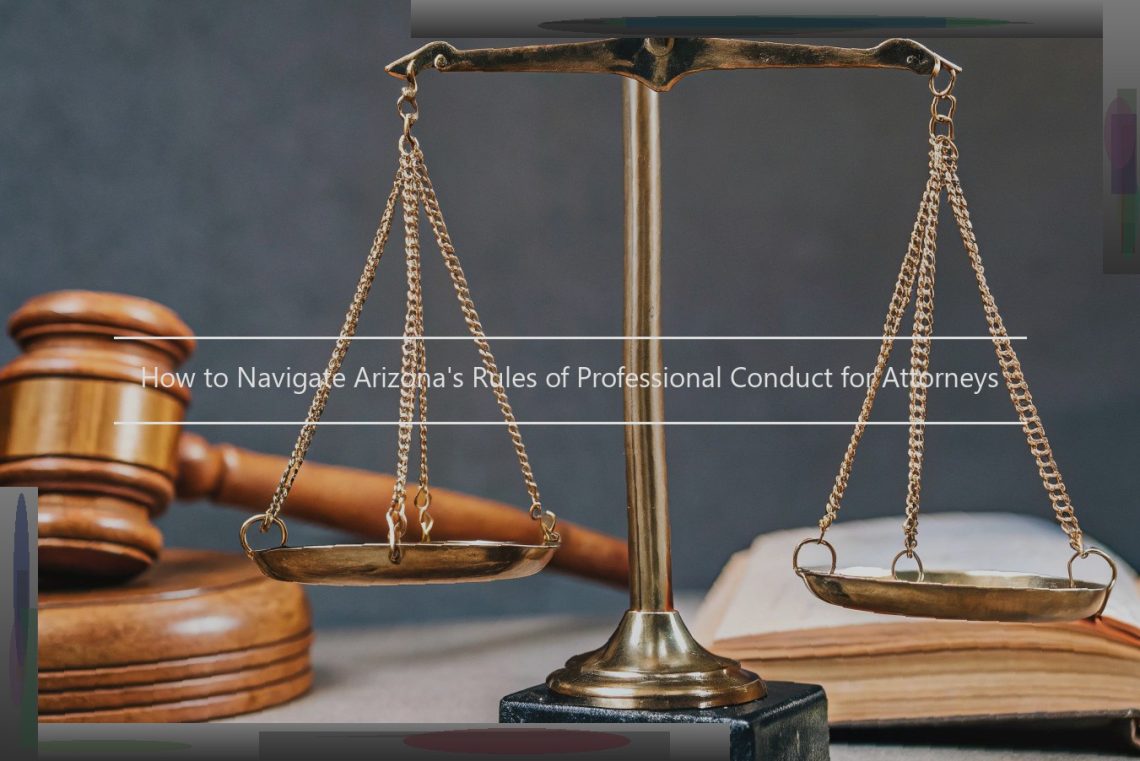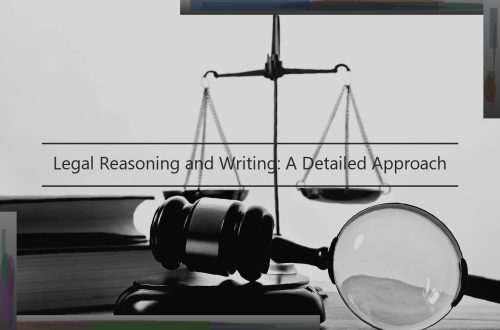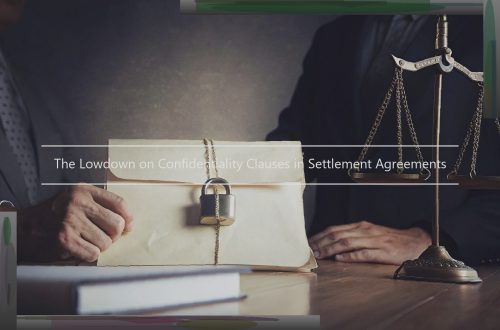
How to Navigate Arizona’s Rules of Professional Conduct for Attorneys
The Significance of Professional Conduct
The Arizona Rules of Professional Conduct are more than just a collection of guidelines; they form the very bedrock of professional integrity and ethical practice for all legal professionals in Arizona. These rules are designed to foster an environment of respect, honor, and professionalism within the legal community, and to assure clients, the public, and the administration of justice of a lawyer’s commitment to fundamental legal ethics. The singular aim of the Rules is to contribute to the just and efficient operation of our legal system. They concern lawyers conduct of the client’s case and the lawyers own conduct. Lawyers are ambassadors of the Profession and should act accordingly.
However, the Rules are not exhaustive in their prescriptiveness; they are but a guide to how attorneys should act ethically, but there is no ‘one-size-fits-all’ in the practice of law. There are many areas where the Rules are vague or ambiguous, requiring attorneys to exercise their own judgment on how to proceed in a given situation. Indeed , a common refrain on the comments section to a Rule is "This Rule does not abrogate the common law with respect to matters covered by this Rule." It is not unusual for the comment to boldly state that "there is no rule of law that requires compliance [with a Rule]." Rather, it is commonly accepted that the Rules are set up as guidelines, and it therefore falls to the attorney to act with "reasonable judgment with respect to the circumstances. Although the attorney must abide by all applicable Rules, the attorney’s requirement to abide by what is called upon by the Rules is subject to those reasonable limitations. Lawyers should be "mindful of their obligations as officers of the court" and "should scrupulously avoid any conduct, whether or not specifically mentioned [in the Rules], that undermines the legal system or the public’s confidence in it." While the Rules may not be absolute, they are nevertheless imperative to ensuring the trustworthiness and accountability of the legal profession.
Summary of Arizona’s Ethics Rules
The Arizona Rules of Professional Conduct govern the ethical behavior of lawyers in the state. Adopted by the Arizona Supreme Court, the rules set out a framework for lawyers licensed in Arizona to follow, providing guidance on how to ethically manage a law practice and interact with clients, opposing counsel, the courts, and the community. The rules apply to all lawyers, in-house counsel, government attorneys, prosecutors, and criminal defense lawyers.
The Arizona Rules of Professions Conduct are broken down into commentary and black letter rules. The "black letter" rules in the Arizona Rules of Professional Conduct ("Rules") are the mandatory requirements. The Comments to the Rules are considered as part of the rules, but not the primary binding authority in ethical matters.
While the Rules and Comments provide a framework for attorney conduct, there may be variations between the ethics rules of the various jurisdictions in which a lawyer is licensed. All attorneys should routinely review the applicable jurisdictions’ rules to ensure each jurisdiction’s minimum current requirements are met.
The rules and comments have been divided into 8 divisions:
The declarations, opinions, and applications in this section have been formally referred to as "Advisory Opinions", but we will use the term "ethics opinions" throughout this article. The opinions derivatively clarify the black letter Rules while defining acceptable professional conduct and inappropriate conduct to guide attorneys. In addition to the ethics opinions, the State Bar of Arizona provides members on its website another form of non-binding authority on ethics opinion: the Professional Practices Handbook.
An attorney who violates a rule may be subject to disciplinary action by the State Bar of Arizona or the Arizona Supreme Court. However, the Rules are not a basis for civil liability.
Duties to Your Clients
Under Rule 1.1 of the Arizona Rules of Professional Conduct, a lawyer must provide competent representation. The comments to Rule 1.1 make clear that a lawyer must be prepared to represent the client "adequately or to withdraw."
Rule 1.4 requires that a lawyer communicate promptly with the client and keep the client reasonably informed about the status of the matter. As the comments note, "[a] lawyer should respond to reasonable requests for information and consult with the client about the means by which the client’s objectives are to be realized."
Rule 1.2 requires that a lawyer be informed when making decisions on behalf of a client. "A lawyer may take action on behalf of a client as authorized by these Rules or at the client’s direction." See the comments to Rule 1.2.
An attorney also has a duty to keep the client’s information confidential. Rule 1.6(A) provides that a lawyer must not reveal information relating to the representation, unless the client gives informed consent or the disclosure is impliedly authorized to advance the best interests of the client.
The disclosure of confidential information is permitted under Rule 1.6(B)(1) through a court order and Rule 1.6(B)(2), when "reasonably necessary to do either one of the following: to prevent reasonably certain death or substantial bodily harm; or to prevent the client from committing a crime or fraud that is reasonably certain to result in substantial injury to the financial interests or property of another and in furtherance of which the client has used or is using the lawyer’s services." "A lawyer may reveal information relating to the representation of a client to the extent the lawyer reasonably believes necessary: and (B)(2) to prevent reasonably certain death or substantial bodily harm; or to prevent or rectify substantial injury to the financial interests or property of another that is reasonably certain to result or has resulted from the client’s commission of a crime or fraud in furtherance of which the client has used the lawyer’s services."
A lawyer’s duty is to zealously represent his or her client. A lawyer cannot allow a conflict of interest to arise as a result of new clients. By having a procedure in place to handle potential conflicts, a lawyer can confirm that it has met its duty of loyalty. See Rule 1.7.
These duties arise from the common law and codified in numerous rules of profession conduct.
Obligations to the Court and Legal Process
The third chapter of Arizona’s Rules of Professional Conduct for lawyers deals with "Ensuring Respect for the Legal System and For Those Who Serve It." These rules set forth the obligations of lawyers as officers of the court, and as unlimited representatives of their clients.
Litigants, even those with meritorious cases, should not expect a lawyer to misrepresent the facts or the law in order to gain an advantage. Lawyers are free to advocate the positions of their clients, but must remember the rules of legal ethics when doing so. Lawyers may not intentionally present false evidence to the court. (Rule 3.3(a)(1)). Lawyers may not knowingly offer false evidence, perjured testimony, or false proof of an affiant’s content when signing an affidavit. (Rule 3.3(a)(3)).
A lawyer may not mislead a judge or jury as to the effect of evidence or the contents of a document (Rule 3.3(a)(2)). In particular, a lawyer may not allow a witness to testify as to the existence of a writing unless they have either a copy or the original writing in their possession in court when testifying.
Litigants should not expect a lawyer to create a second set of exhibits for that lawyer’s winning case, and not have expected copies for their opponent. (Rule 3.4(b)). Lawyers may not knowingly disobey a court order, even if a basis exists to keep the information confidential. (Rule 3.4(c)). Lawyers may not engage in "undue influence" of those assisting in the representation of the client. (Rule 3.4(e)).
The "coordination of case filings" among lawyers, with the intent of harming a party and without that party’s consent is forbidden. (Rule 3.4(f)). Lawyers may not use peremptory strikes solely on the basis of race. (Rule 3.4(g)). Lawyers may not communicate with any party regarding the potential testimony of any unrepresented person. (Rule 3.4(h)). Many of the concepts in Rules 3.4(e)-(h) are based upon government lawyers creating a so-called "office policy" that is forbidden to be used for the purpose of harming persons who are not involved in the case.
It is important to keep in mind that the consequences of violating these rules can be severe. Arizona courts have held that violations of these rules affect the fairness of the legal system.
Advertising and Solicitation Guidelines
Arizona’s advertising and solicitation rules are designed to protect the public from misleading or overreaching communications by lawyers—that’s a no-brainer. The same protections serve to better inform the public regarding the services available to them and helps to maintain the honor of the profession. As with all things "lawyer," these rules are complicated. But here’s a quick hit, just in time for those late-night study sessions:
What Is Permitted
Advertising. Lawyers may advertise their services, and may do so through any means that is not false or misleading, and complies with other ethical standards. While advertising is allowed, it must be noted that such communications are considered "unethical legal advertising" and cannot be undertaken for purposes of obtaining business through content that gives false expectations and contains unverifiable claims. Specifically, "An advertisement shall not make comparisons with other lawyers’ services; and shall not contain misleading, deceptive or in some manner fraudulent statements by inference or otherwise. A lawyer shall not use language in an advertisement that leads a potential client to conclude that the lawyer is able to obtain results similar to those obtained by that lawyer or other lawyers in previously resolved matters in which the lawyer was associated." Ariz. R. Sup. Ct. 42, ER 7.1.
Solicitation. For purposes of Rule 7.3, "solicitation" refers to direct contact with a potential client. According to the rule, "A lawyer shall not by in-person, live telephone or real-time electronic contact, solicit employment from a prospective client when a significant motive for the lawyer’s doing so is the lawyer’s pecuniary gain." Ariz. R. Sup. Ct. 42, ER 7.3. Incidentally , the "significant motive" standard asked of a lawyer wishing to solicit business aims to find that pecuniary gain is a predominant motive behind a lawyer’s solicitation. Those falling into the "unsolicited person" category are considered a "lucky group," and lawyers may solicit business from them.
What Is Prohibited
Under Arizona’s Rules of Professional Conduct, there are specific prohibitions on advertisements and solicitations. For example, prohibits statements or claims that violate the prohibition against professional misconduct that involves dishonesty, fraud, deceit or misrepresentation. The rules also prohibits the recommendation of any product, service or publication that is likely to create an expectation of results obtained, or promises a result. Any advertisement or solicitation that contains anything that a net impression would be of statements banned by the rules is prohibited.
Truth Is Key
As you might expect, the rules of advertising and solicitation for lawyers rely heavily on the basic principle of truth. According to the rules, "[a]dvertising and soliciting must be truthful and the information provided must be reasonably helpful to the public." Ariz. R. Sup. Ct. 42. The "truthfulness" aspect requires that a lawyer’s communications must be accurate, and that the content is not misleading. It is important when advertising and soliciting to make sure that the ad or solicitation doesn’t leave out factual information that, if included, would alter its meaning. But, do not fear the lawyers! Advertising is permitted in order to promote a lawyer’s services and offer an explanation of the type of services available to the public. There you have it, lawyers. Another aspect of practicing law decoded for your understanding and entertainment.
Disciplinary Actions and Penalties
When a lawyer violates the Rules of Professional Conduct, Arizona imposes disciplinary measures that can range from simple censures to disbarment. The disciplinary toolbox includes admonitions, censures, probation with or without suspension, suspensions and disbarment. While admonitions are nonpublic, attorneys may only receive one admonition in a lifetime unless the second admonition is imposed due to a violation of any law or statute, such as misappropriation, conviction of a felony, conversion, forgery or misrepresentation. After one admonition, each additional admonition will be public.
The nonpublic admonition is not a sanction, but instead is a warning to members of the State Bar of Arizona. Censures are issued for violations of the Rules of Professional Conduct and are a form of public reprimand reserved for less serious conduct not requiring more severe sanctions. Censures are a serious matter as they de facto result in an increase in insurance costs for the attorney if the malpractice insurer is not notified of a censure. Attorneys receiving a censure will be suspended for three months if found guilty of a subsequent violation of a Rule for which a censure or harsher sanction may be imposed. Censures are imposed much more frequently than admonitions and carry with them public humiliation for attorneys when the censure is reported in the State Bar of Arizona’s annual report as well as in its quarterly magazine.
Probation can be ordered by the State Bar Probation Monitors to run in conjunction with a suspension. Probation without suspension is rare. When an attorney receives a suspension, it may be for any period of time "except" for a fixed period of time exceeding three years. Suspensions are issued for the most serious types of violations, often involving criminal activity. Disbarment includes a reinstatement period of two years and is for the most egregious violations. Depending upon the violation, the State Bar of Arizona may also impose conditions, including requiring the attorney to complete office management and/or continuing legal education classes. For example, a violation of Rule 1.3, fail to act with reasonable diligence and promptness in representing a client, can result in a censure or even harsher discipline for a pattern of neglect. Consequences can escalate quickly.
Further Information for Arizona Attorneys
To help Arizona’s attorneys meet their professional conduct obligations, there are a number of resources available. The State Bar of Arizona offers a number of programs that might be of use to attorneys. There are also a number of other resources, included those offered on the Internet.
The State Bar of Arizona has an Ethics Department that has created an Ask the Ethics Guy! feature, which allows for a dialogue between members and an ethics attorney through the Internet. The Ethics Department also conducts live seminars on professional conduct. Most large law firms also have a professional ethics contact to turn to with questions. To contact the Ethics Department at the State Bar of Arizona, call (602) 340-7284.
Scholarly articles and publications are another source of information. The ASU Sandra Day O’Connor College of Law and the University of Arizona College of Law both publish law reviews that occasionally issue articles on legal ethics. The volume numbers of these Journal publications include articles treating issues of professional conduct. The state’s largest legal publishers also issue treatises and loose-leaf services covering ABA Model Rules and ethical issues .
In addition, a number of professional organizations publish articles and newsletters attuned to ethical issues in their practice areas. For example, the Arizona Prosecuting Attorneys’ Advisory Council in Phoenix publishes an annual packet of the Ethics and Professional Conduct Resources, an ongoing compilation of ethics opinions and memos relevant to Arizona prosecutors.
Membership in a State Bar Section is another way to stay connected and current in specific practice areas in Arizona. A number of the State Bar Sections publish newsletters that cover ethics issues in the section’s practice area. Members can join an official State Bar Section for an annual fee of $25 by going to the State Bar’s membership site on the web and following the prompts.
Some websites provide information and guidance on ethical issues. The State Bar of Arizona offers state-specific legal links, including legal ethics sites. Bar association websites, such as the American Bar Association Center for Professional Responsibility and Ethics Resources on the Web, offer additional sources of information on this topic.
Consulting a professional conduct expert is always a good idea when questions arise. But lawyers also have an array of resources available to them to help them meet their professional conduct obligations.




